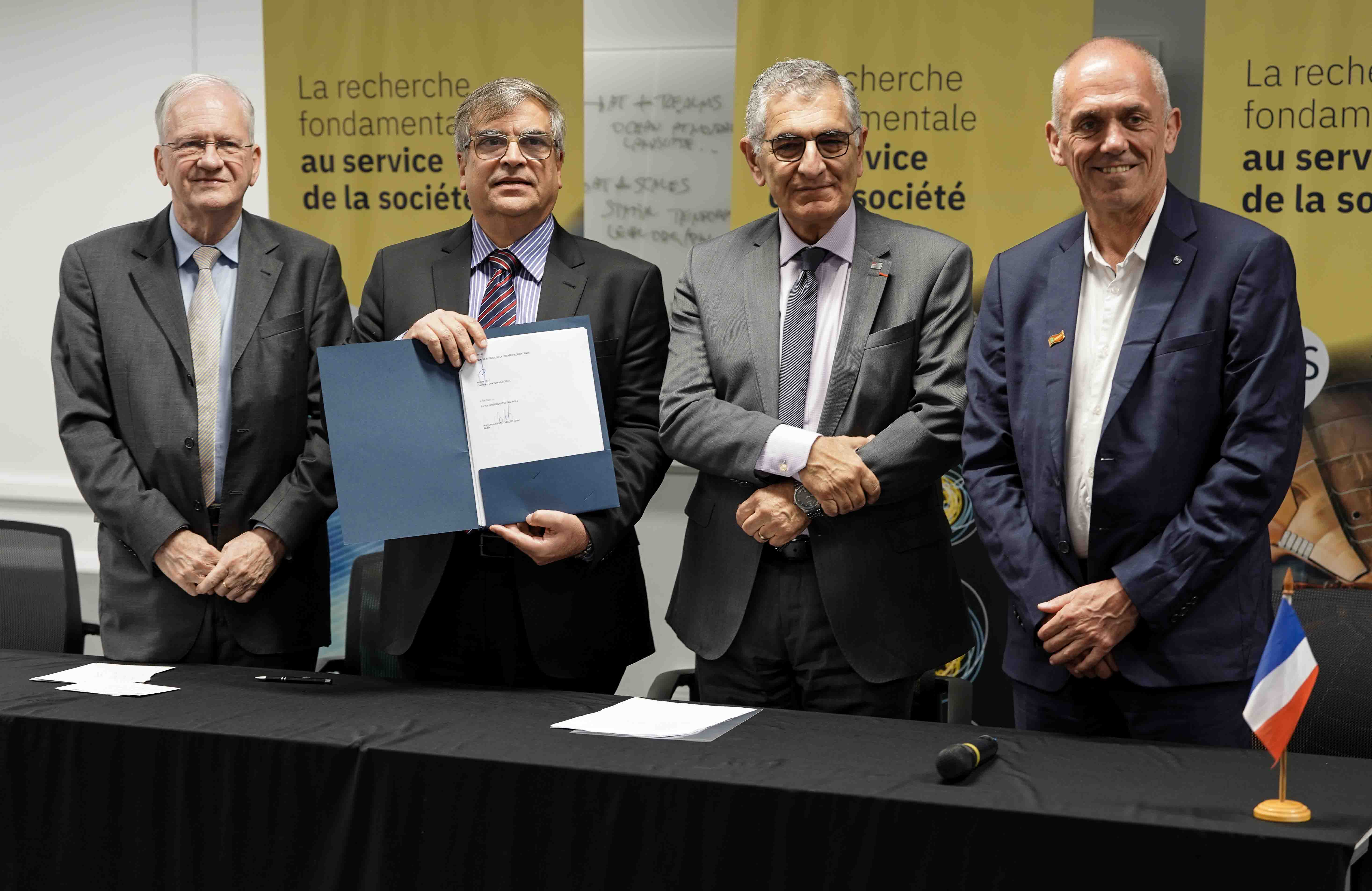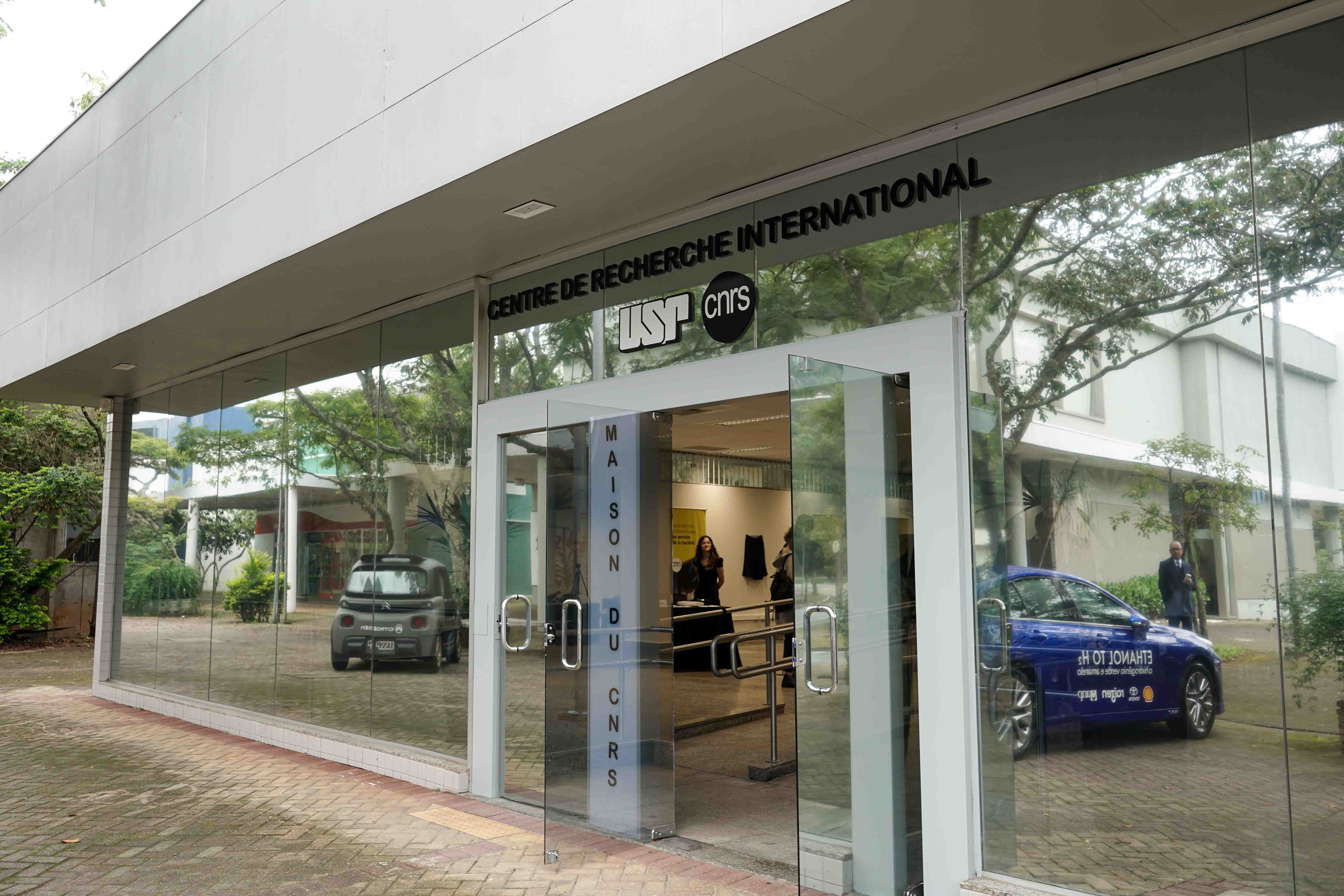


Marco Antonio Zago, Carlos Gilberto Carlotti Junior, Vahan Agopyan and Antoine Petit (photo: Daniel Antônio/Agência FAPESP)
Published on 04/08/2024
By Elton Alisson | Agência FAPESP – On March 27, FAPESP, France’s National Center for Scientific Research (CNRS) and the University of São Paulo (USP) signed a memorandum of understanding to fund scientific projects that will be conducted under the aegis of the new Worlds in Transition International Research Center (IRC).
The IRC will be located on USP’s main campus and will be the fifth such center set up by CNRS in partnership with universities. CNRS has similar partnerships with the University of Arizona and the University of Chicago in the United States, Imperial College London in the United Kingdom, and the University of Tokyo in Japan. A sixth center will soon be unveiled in Canada, according to Antoine Petit, CEO of CNRS, who announced the initiative during a press conference held when the IRC opened its doors at USP.

The entrance to the new Worlds in Transition International Research Center at USP (photo: Daniel Antônio/Agência FAPESP)
“We have a limited number of these centers worldwide because they require strong engagement to complete the projects we really want to conduct,” Petit said.
The choice of USP to host the new center was determined largely because of the university’s significant contribution to Brazilian scientific production and the strong support assured by FAPESP, he added. “We always seek cooperation with the best research institutions worldwide, and we know USP is a key player in Brazil. It’s also one of the leading Brazilian universities, as shown by international rankings. We already cooperated with USP and other institutions in Brazil, but we realized we should advance to a new level,” he said.
The IRC’s mission will be to promote collaboration between CNRS and USP in research and academic training at the undergraduate, graduate and postdoctoral levels, as well as for early-career researchers.
Research projects will focus initially on seven priority areas: humanities, oceans, decarbonization, biodiversity, high-performance computing, immunology, and quantum technologies. These areas are considered emerging disciplines in a world in transition, but support for projects in other areas may also be available, according to Petit.
“We share an interest in topics such as the Amazon Rainforest and biodiversity, but if researchers at both institutions [USP and CNRS] are willing to collaborate on projects on other topics than our priorities, we will strive to leave the door open,” he said.
Marco Antonio Zago, President of FAPESP, pledged to support collaborative projects by researchers affiliated with USP and CNRS, as well as seminars, meetings and other scientific activities, with an amount of funding that will be similar to that contributed by CNRS. USP’s contribution will take the form of salaries for researchers and supporting personnel, and the university is also providing the IRC’s office space, infrastructure and utilities.
As part of its initiative of supporting the establishment of international research centers in São Paulo state, such as the IRC, FAPESP has reserved BRL 30 million for USP to invest with the consent of the IRC’s governing bodies and in accordance with FAPESP’s regular grant instruments.
“The establishment of the new CNRS center at USP is part of a strategy being rolled out by FAPESP with the state of São Paulo’s universities and research institutions to make our science more international by helping important research institutions build a permanent presence here,” Zago said.
“CNRS will bring researchers from France to work at the new center alongside USP’s researchers. This same dynamic is already happening at Institut Pasteur de São Paulo [IPSP] and ICTP.”
ICTP is the International Center for Theoretical Physics. Its partner institute ICTP-South American Institute for Fundamental Research (ICTP-SAIFR), hosted by São Paulo State University (UNESP) in São Paulo city, fosters the advancement of basic science in South America.
For Carlos Gilberto Carlotti Junior, Rector of USP, the new center represents one more step in the internationalization of USP and Brazilian science. “We believe internationalization to be an extremely important means of enhancing the education of our students and the quality of our research. We invest first in researcher mobility and then in joint research projects. We’re now seeking to partner with various international laboratories, bringing foreign researchers over here to work with our researchers, and studying and pursuing joint solutions to problems,” he said.
Vahan Agopyan, São Paulo State Secretary for Science, Technology and Innovation, stressed that establishment of the IRC at USP is a major achievement for the state. “We’re very pleased that São Paulo is attracting global institutions of the importance of CNRS, which confirms that the state offers advantageous conditions and an ideal environment for scientific development,” he said.
International research laboratory
During the unveiling of the IRC, CNRS and USP also signed an agreement to set up an International Research Laboratory (IRL) in immunology at the University of São Paulo’s Ribeirão Preto Medical School (FMRP-USP).
CNRS has 80 laboratories of this kind in several areas, with researchers, students, postdocs, engineers and technicians from CNRS and partner institutions.
“A French scientist who will be one of the heads of the immunology research lab has been working at USP since January. The lab is starting to operate, and we will unveil a humanities and social science lab in September,” Petit said.
During his visit to the new IRC, he announced that CNRS will transfer its South American office from Rio de Janeiro to USP in São Paulo.
“Our being here [at USP] will facilitate our relationship,” he said.
Source: https://agencia.fapesp.br/51330